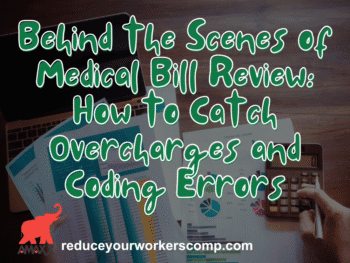
The first line of assistance is generally provided by registered nurses who have prominent roles in utilization review and case management, the latter performed either telephonically, or in the ‘field’ in direct contact with claimants and treating physicians.
However, a resource that is often underutilized is physician expertise which can be provided in various ways. This article discusses the options and optimal avenues of physician review based on the circumstances and requirements of the request.
Click Link to Access Free PDF Download
“The 6-Step Process To Determine Workers’ Comp Injury Causation”
File (Peer) Review:
Physician review consists of a review of the medical records and is often supplemented with a telephone call between a reviewing and treating physician (peer-to-peer conference).
In this scenario, there is no contact (i.e., physical examination) between the peer reviewer and the claimant. All the information required for the decision is obtained via:
- medical records
- imaging reports
- claim records
- data obtained by the reviewer’s conversations, if any, with one or more treating physicians.
There should be an attempt to match the expertise of the reviewing physician with that of the treating physician, referred to as specialty-matching. This ensures that treating physicians cannot assert their cases have been evaluated by physicians with a lesser degree of training and experience than they possess.
Peer review physicians may be “medical directors” of payer organizations (carriers, TPAs, managed care companies,) but more commonly they are practicing physicians independently-contracted by these organizations to perform peer reviews.
It is important to credential all peer reviewers to ensure that they are board-certified, have active and unrestricted state licensure, and have no record of significant sanctions that would present a credibility obstacle if a determination were to be challenged. Many payers establish relationships with vendors providing national networks of credentialed peer review physicians in all specialties, and this may be a convenient and effective approach that eliminates the need of the payer to “build” a panel of reviewers from scratch.
When is a peer review appropriate?
-
Utilization Review
If a medical service subject to prior authorization is deemed questionable by an R.N., then peer review is required to make a final decision. Note that some states require the reviewing physician to be licensed in the jurisdiction where the claim occurs; most states do not have this requirement. This review process can also be applied to the review of non-formulary drugs.
-
Causation
Peer review physicians can be helpful in advising a claim adjuster as to whether an alleged injury or illness is occupationally-related, and therefore compensable.
-
Appropriateness of a Treatment Plan
When a claim adjuster or case manager is faced with a case that is not progressing well towards resolution, a peer review of the entire course of evaluation and treatment may yield suggestions for a reassessment of the diagnosis, and/or alternative therapeutic interventions that might be more successful.
-
Return-to-Work (RTW) Determinations
Reviewers can indicate whether, based on objective findings in the file or reported by a treating physician, a claimant is functionally able to RTW, either at full-duty or modified by specific restrictions or limitations. Reviewers may also be able to opine on the face-validity of impairment ratings assigned by treating physicians.
Independent Medical Examinations (IMEs):
IMEs entail a referral to a physician for a comprehensive physical examination and responses to specific questions posed by claim adjusters.
As with file reviewers, the right specialty should be selected for the exam, and the qualifications and standing of IME physicians must be established via a thorough credentialing process. Casual referrals to local physicians are often not the best approach; the use of vendors with established networks of IME physicians subject to careful quality control is recommended.
When is an IME appropriate?
- IMEs are not useful for:
- utilization review of services and drugs, except in a few exceptional circumstances.
- causation determinations, or treatment planning, both of which are relatively easy to accomplish based on a review of medical files and current familiarity with evidence-based medical practice guidelines.
- IMEs may be useful when a physical examination by the responding physician is important
- determinations of maximum medical improvement (MMI) status;
- definitive impairment ratings based on the impairment guide mandated in the jurisdiction of the claim.
- IMEs will hold greater weight in litigated claims, particularly when an appearance at a state board hearing is scheduled or anticipated.
Peer Reviews Should be First Option
In general, peer reviews should be considered the first option for obtaining physician expertise, unless an IME is strongly indicated by the above criteria.
Speed
- Peer reviews can be obtained very quickly. Depending on the nature of the review, decisions are typically available from the same-day up to 5 days from referral.
- IMEs require advance scheduling, and usually reports are not available for 10-14 days. Therefore, the handling of a claim can be expedited via peer review.
Cost
Given the great cost disparity, a peer review is often a reasonable and cost-effective initial tool, even if one ultimately may need to resort to an IME.
- From a cost perspective, peer reviews range in price from $75- $300, again varying based on the type of review.
- IMEs, on the other hand, tend to range between $300-$2000, based on provider specialty and location, and the negotiating leverage that is applied.
Collaboration
In addition to access and cost factors, a peer review with a peer-to-peer conversation also has the advantage of facilitating a constructive and collegial dialog between the peer reviewer and the treating physician.
- When the peer review is well-handled, one can often engage the treater as a partner in the effective management of a claim, rather than as an adversary, and this can result in timely recovery and resolution of the claim.
- IMEs do not offer this opportunity for collaboration.




























